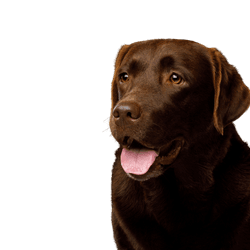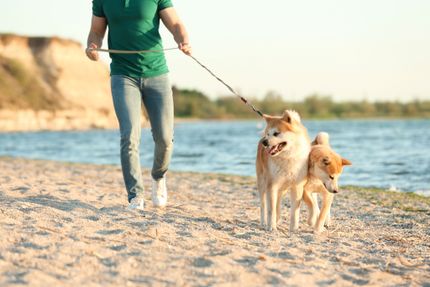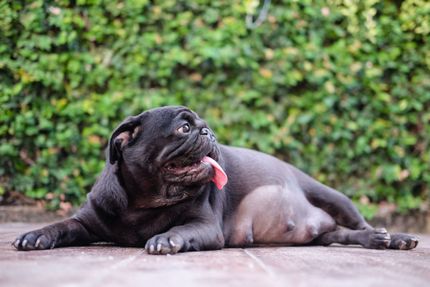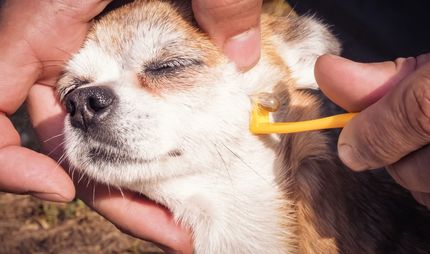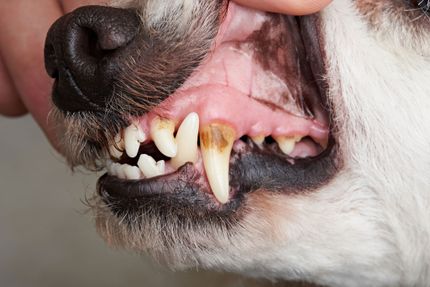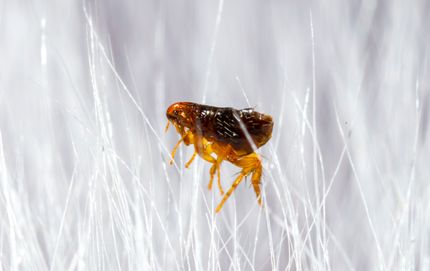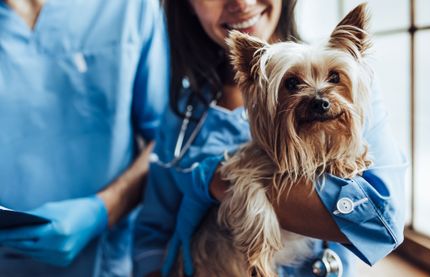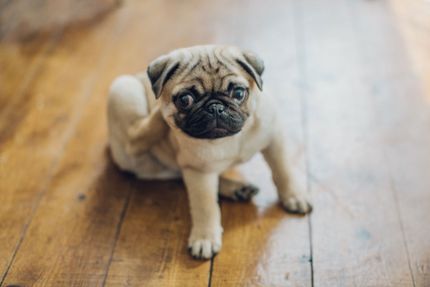Pugador:Labrador Retriever and Pug Mix
Facts & Origin
Pug and Labrador Retriever mix - a hybrid breed.
Pugs and Labrador Retrievers are two of the most popular dog breeds in the world. They are both known for their friendly nature and love for attention. Now imagine a dog that combines the best qualities of both breeds! These dogs are sure to put a smile on your face and make great companions for any activity.
Mixed breeds between Labrador Retrievers and Pugs are dogs that combine the characteristics of both parents. Labrador Retrievers are known for their intelligence, friendliness and ability to be easily trained, while Pugs are known for their affection, protective instincts and people-oriented personalities. Mixed breeds between these two could therefore make good family dogs or companion dogs, and could also get along well with children and other pets. They tend to be active and need regular exercise and mental stimulation to stay happy and healthy. Their coats may require regular grooming to stay in good condition. Generally, these dogs have a life expectancy of about 10 to 14 years.
| Alternate Name | - |
| Origin | UK - China |
| Life expectancy | 10 - 15 years |
| Care requirements | low-maintenance |
| Activity level | average - low |
| FCI group | not recognised |
| AKC group | not recognised |
| KC group | not recognised |
More Labrador Retriever mixes
More Pug mixes
Attitude, character and temperament of the breed
Possible character traits of Pug and Labrador Retriever mix - Such is probably his nature.
Pug and Labrador Retriever mixes are becoming increasingly popular as people look for unique and interesting dog breeds. These dogs are a mix of two of the most popular dog breeds in the United States, making them the perfect choice for families looking for a new furry friend.
Pugs are known for their adorable, wrinkled faces and laid-back personalities. They are friendly and loving dogs that enjoy spending time with their family. Pugs are also relatively low energy, which makes them ideal for families with small children or people who live in small apartments.
Labradors are known for their boundless energy and enthusiasm. They are athletic dogs that love to play fetch and go for long walks. They are also very intelligent and easy to train, which makes them great family dogs.
Pug and Labrador mixes combine the best of both worlds. They are loving and affectionate like Pugs, but also active and playful like Labradors. These dogs make great family pets and will give their owners many years of enjoyment.
Character
Usage


Health and breeding information
What diseases can occur in pug and Labrador Retriever mix.
The Pug-Labrador Retriever mix is a cross between a Pug and a Labrador Retriever. These dogs are known for being outgoing, friendly and loving. They make excellent family dogs and get along well with children. However, like all dog breeds, they are prone to certain health problems. Some of the most common health problems found in Pug-Labrador-Retriever mixes include hip dysplasia, elbow dysplasia, and allergies.
Allergies are a common problem in dogs, and Pug-Labrador-Retriever mixes are no exception. Allergies can be caused by many things, including food, environmental factors, and chemicals. Symptoms of allergies include itching, redness, and swelling. If left untreated, allergies can lead to secondary infections.
What does this mixed breed look like?
The coat of a Pug-Labrador-Retriever mix is usually short and dense. The most common colors are black, brown or fawn. These dogs may also have markings on the face, chest and legs.
What are breed characteristics of this mix dog?
A Pug-Labrador Retriever mix is a medium-sized dog with a short, stocky body. They typically weigh between 10-30 kg and have a height of 38-48 cm. They have a strong, muscular build with a broad chest and thick legs. Their fur is short and dense, and they have a black mask on their face.
| Fur length | short |
| Fur | flat coated |
| Ear shape | Triangle - Tilt-ear |
| Tail | lang - stubby |
| Anatomy | rugged, massive, massive, square, hefty |
| Size ♀ | 22 - 60 cm |
| Weight ♀ | 6 - 32 kg |
| Size ♂ | 25 - 63 cm |
| Weight ♂ | 6 - 32 kg |
| Suitable For | Beginner, Blind people, Children, Seniors, Beginner, Children, Seniors |
Known Diseases
Eye diseases
Often occur with allergies and intolerances.
Elbow dysplasia (ED)
Elbow joint dysplasia is a chronic disease complex of the elbow joint of fast growing dog breeds.
Joint damage
In some breeds, joint damage can occur later in life, affecting the musculoskeletal system.
Hip dysplasia (HD)
The hip dysplasia or hip joint dysplasia of the dog (HD) is a maldevelopment of the hip joint.
Overweight
Often, unfortunately, the dogs very much under excess weight. But the dogs themselves are never to blame!
Breathing problems
Dogs with shortened muzzles can often experience respiratory problems.
Denture malocclusions
Malocclusions of the dentition often occur in dogs with short muzzles.
Heart disease
Can occur frequently in dogs and can sometimes be treated with medication.
Shortness of breath
Difficult breathing can be recognized by the dog's rattling and sometimes accelerated breathing rate.
FAQ
-
This mix is likely to have a brown, black or fawn coat with a black mask. The coat is short to medium length and can be either straight or slightly wavy. The head is rather round with a short muzzle and floppy ears. The eyes are large and dark. The tail is medium long and can be either straight or slightly curved. The legs are of medium length and the body is compact. Overall, this mix is a small to medium sized dog. It can weigh between 10-30 kg and have a height of 38-48 cm.
-
This mix is likely to be a friendly, outgoing and social dog. They will get along well with other dogs and with children. They will be active and playful, but not overly hyperactive. They may bark a bit, but are not considered a yappy breed. They are loyal and affectionate to their family and make an excellent companion dog.
-
This mix needs moderate exercise. A daily walk or play session is sufficient. They are well suited to a home with a garden, but do not need much space. They like to play catch or go swimming.
-
The life expectancy of this mixture is 10-12 years.
-
There are some health issues to consider with this mix. These include hip dysplasia, elbow dysplasia, patellar luxation, eye problems and breathing problems. Some of these conditions can be alleviated with proper diet and exercise. It is important to consult a veterinarian when health problems arise.
Useful Articles
You can find articles that might interest you in the dogbible blog to match your favorite breed.
Visit our magazineto stay up to date on dog trends.
To find out more, view our Privacy Policy
Find here the breed that suits you and find out what character traits it has. Here you can also learn more about the origin, size and weight of your favorite breeds.
Matching your favorite breed, you'll find articles that might interest you on the dogbible dog blog.
3 reasons why your dog scratches all the time
